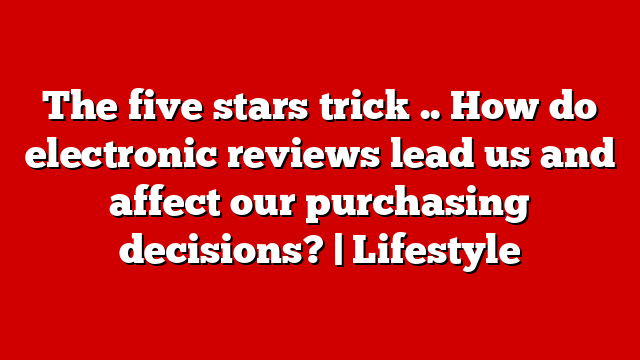In our digital age, electronic reviews have become a “confidence coin” that deeply affects the purchase decisions. Shopping today tends to rely on user evaluations more than traditional ads, especially those that depend on the stars system.
Despite what appears to be the importance of these reviews, the spread of fake or exaggerated reviews raises serious questions about their credibility, and makes us wonder: Does electronic assessments reflect the quality of products really, or do we mislead our choices?
The power of electronic reviews
Several studies indicate that electronic reviews have a concrete effect on consumer behavior. According to the “Spiegel” research center at Northwestern University, the display of reviews increases the probability of purchase by up to 270%, especially for high -prices products. The number of reviews contributes to enhancing the credibility of the product, and increases the chances of selling it.
But the effect is not only related to the number of reviews, but its content. Reviews that include accurate details and personal experiences are more influential than that or brief public. Also, the balance between positive and negative reviews gives the consumer a realistic image, and helps him make an enlightened decision.

Why do we rely on the opinions of strangers?
Although we often do not know who writes electronic reviews, we depend heavily. This is related to several factors:
- Social evidence: Psychologist Robert Sieldini formulated this concept, explaining that people tend to imitate others, especially in unclear situations. And when we see a product that has hundreds of positive assessments, we automatically assume it is a good product.
- The effect of consumer reviews: In an article published in 2024 in the Magazine of the University of Oxford, the study showed that high -evaluation products attract a greater number of buyers, even if the reviews are superficial, due to the phenomenon of “collective dependency”.
- Story narrative power: Research has shown that reviews that include stories and personal experiences affect more than those that depend on abstract statistics. In an article published in the magazine “California Management Review”, Dr. Jennifer Aker, Professor of Marketing at Stanford University, explains that the narrative narration is not satisfied with attracting attention, but rather establishes messages in memory and raises the emotional response, which makes it an effective marketing tool that exceeds the mere displaying features.
Another aspect of reviews: counterfeiting and manipulation
Despite the benefits, reviews are not without a dark face. Some companies resort to buying fake reviews to improve their image or offend their competitors. According to a report issued by the World Economic Forum, about 4% of all electronic reviews are fake, which leads to a direct economic impact exceeding 152 billion dollars annually.
The manipulation is not limited to companies, but also includes some consumers who write misleading reviews in the incentives and discounts. Hence, the need for cash awareness emerges when dealing with assessments.
The psychological impact of the culture of continuous evaluation
Electronic reviews have turned into a psychological pressure source in daily life. In an article published by the British newspaper “The Guardian” in April 2025, the anxiety specialist in Patterson explained that the repeated requests for writing the assessments and spending a long time reading evaluations before simple decisions, causing continuous tension and changing people’s interaction with shopping and services.
The obsession with companies may push companies to focus on the stars instead of quality, by giving gifts for positive reviews, or filling the product pages with old reviews. Emotional manipulation is also used to increase the effect, through influential stories such as: “I bought it for my sick daughter,” which doubles the pressure on consumers and service providers.
How do we protect ourselves from the “five stars trick”?
- Compare multiple sources: Don’t rely on only one location. Read assessments from different sites to obtain a balanced image, focus on reviews that include real experiences and accurate details, and avoid public or evacuated assessments.
- Look for balance: The presence of some negative reviews does not necessarily mean that the product is bad, but may be evidence of the credibility of the assessments. Focus on repeated complaints instead of individual opinions.
- Be aware of the manipulation: Check the history of the auditors, monitor the language and timing style, and avoid accounts that decline products from one company only.
- Use verification tools: Depend on tools such as Fakespot and Reviefmeta that use artificial intelligence to analyze reviews and detect the false ones.
- Depend on your personal experience: After conducting the research and verification, the purchase decision remains in the end personally. Your actual experiences and needs may be the best standard for judgment.
Although electronic reviews have become a powerful tool in purchase decisions, awareness of the risks associated with it is necessary. Through critical analysis and verification of the credibility of the sources, we can benefit from it without falling into the trap of the “Five Stars Cross”.

